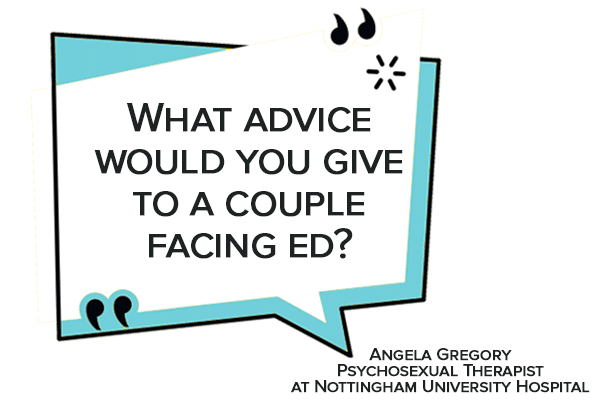How to support a Partner with ED
As a partner, we can sometimes feel as though we are responsible for the wellbeing of our loved ones. If your partner regularly cannot get or keep an erection, your first instinct may be to blame yourself. Don’t. Your husband’s ED is not caused by anything you’ve done. ED can’t be cured by sexy new lingerie or more variety in the bedroom, because it isn’t related to his attraction to you. His inability to “perform” is most likely a physical condition that is often linked to medical problems such as diabetes, high cholesterol, or early-stage heart conditions. Discover ways to support your partner in this fight.

How to cope erectile dysfunction with your partner?

This might sound worrisome too, but it is news with a silver lining. Having a medical cause for ED means help is available. With treatment, your partner can get back to sweeping you off your feet.
Support for spouses and partners
Opening the lines of communication
Dealing with ED is stressful for any man, even when he is nowhere near the bedroom. Since erections are often portrayed in popular culture as a sign of masculinity, it’s no surprise that ED can him lead to feelings of depression, low self-esteem, anxiety or guilt.
If you’ve noticed that your sweetheart is hesitant to hug, kiss, or show any affection, he’s probably worried about what will happen if things turn physical and he’s unable to satisfy you. No man wants to feel like he is disappointing the partner he loves.
Minimizing the problem might seem helpful, but telling your partner his erectile dysfunction doesn’t matter may make it sound like you don’t miss sexual intimacy. This message is can be hurtful and may only cause him to withdraw even further.
To show your support, arrange a time to talk where you both feel relaxed. You want to be far away from the bedroom when this conversation occurs. Try having the discussion after you’ve enjoyed a meal or watched a funny movie together. Share the ED information you have uncovered. Let him know that you care about his health and happiness, and gently encourage him to see his doctor or nurse. You can offer to join him at his appointment, but he might be more comfortable having a private conversation with his doctor or nurse. He will know what feels right.
DON’T blame yourself
When a man struggles with ED, the partner tends to blame themselves first. They think it is their fault, that maybe their partner isn’t attracted to them any longer. They often don’t realize that their partner’s ED is caused by a medical reason.
DO your homework.
Many people view ED as a sexual issue, when in fact, it is usually a physical one. Conditions such as diabetes, high cholesterol, or early-stage heart conditions can all contribute to ED. Even certain medications can bring on ED. The faster you realise that this is a medical condition affecting your partner’s body, the faster the healing can begin.
DON’T approach the issue with negative emotions.
A man with ED will often experience deep feelings of shame, loneliness, anxiety and depression. He will often say that the inability to have an erection makes him feel like less of a man. In fact, he may be hesitant to kiss or cuddle you because he is embarrassed about where it might lead. Confronting him with feelings of hurt or anger may make him feel attacked, so he may withdraw even further.
DO open the lines of communication.
Have a conversation with your man—but not in the bedroom. Put some time and space between your conversation and your last sexual encounter. Make your partner aware of the health conditions that can cause ED, and gently suggest he sees his doctor. Some men may ask you to join them at their appointment, while others may prefer to have a private conversation with their doctor. Let him decide.
DON’T tell him that his ED does not matter.
Some partners think they are being helpful by saying their partner’s ED isn’t a big deal. It matters deeply to him, and suggesting otherwise sends the message that you don’t miss intimate, sexual contact with him, which can be very hurtful.
Find out more about “Facing ED in your couple” in the additional videos of Angela Gregory – Psychosexual Counsellor




